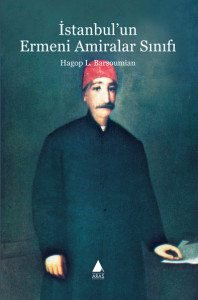ISTANBUL, Turkey (A.W.)—On Dec. 25, 2013, Istanbul’s Aras Publishing published the Turkish translation of Hagop L. Barsoumian’s The Armenian Amira Class of Istanbul (İstanbul’un Ermeni Amiralar Sınıfı, in Turkish). Human rights activist Ayse Gunaysu, who is also a professional translator and a columnist for the Armenian Weekly, edited the book and prepared it for publication.

Originally published by the American University of Armenia (AUA) in 2007, The Armenian Amira Class of Istanbul was Barsoumian’s 1980 doctoral dissertation at Columbia University.
The book opens with a heartfelt tribute to the author by his wife, Anais, who brought about the publication 21 years after Hagop Barsoumian’s disappearance during the Lebanese civil war in 1986.
Khachig Tololyan, professor of English and chair of the English department at Wesleyan University, and a longtime friend of the author, notes in the preface, “At the time of its completion around 1979 it was, as it remains now, the most thorough study of the Armenian amiras of the Ottoman Empire.”
The Armenian Amira Class of Istanbul provides the story of the powerful elite group known as the amiras, tracing their rise, dominance, and, ultimately, decline. Barsoumian’s research also draws the genealogical connections between these elite families, and the role these relationships played in maintaining power.
“No one has done this for the amiras with anything remotely approaching Barsoumian’s thoroughness. His grasp of these connections of descent and marriage enables him to write confidently about the ways in which a dominant elite constructed and sustained itself,” writes Tololyan.
Born in Aleppo in 1936 to Ayntabtsi parents and genocide survivors, Barsoumian attended the Karen Jeppe Jemaran. In 1960, he settled in the San Francisco, Calif. He attended San Francisco State College, where he earned a B.S. (1964), followed by an M.A. (1969) in international trade, focusing on the European common market. In 1972, he relocated to New York. In 1975, he earned another M.A. in Middle East history from New York University and, five years later, earned his Ph.D. from Columbia University in Ottoman history. Barsoumian then moved to Beirut, where he taught history and Middle East politics at Haigazian University. On Jan. 31, 1986, he was kidnapped, and was not seen again.



Is this book available in an English translation?
Well done.
I wanted to find the book in English, so I googled it by title. I found several links, including a Wikipedia entry! So it does exist in English. I’m glad to know about this scholarship, and I’m impressed that it will be read in Turkey. I wonder what will happen, now that the denial is getting harder to sustain. All those Turks in Germany are learning about the Holocaust, and because Germany is examining its history even more, the role Germany played in the Genocide is coming out — and the fact of the Genocide is widely accepted in Germany and therefore unavoidable for the Turks there. And the truth can’t be hidden any longer.
Is the book published by the American University of Armenian available, and if so how can one order/buy it? (2007)
There’s a similar book translated from French to English: The Amiras: Lords of Ottoman Armenia: Pascal Carmont.